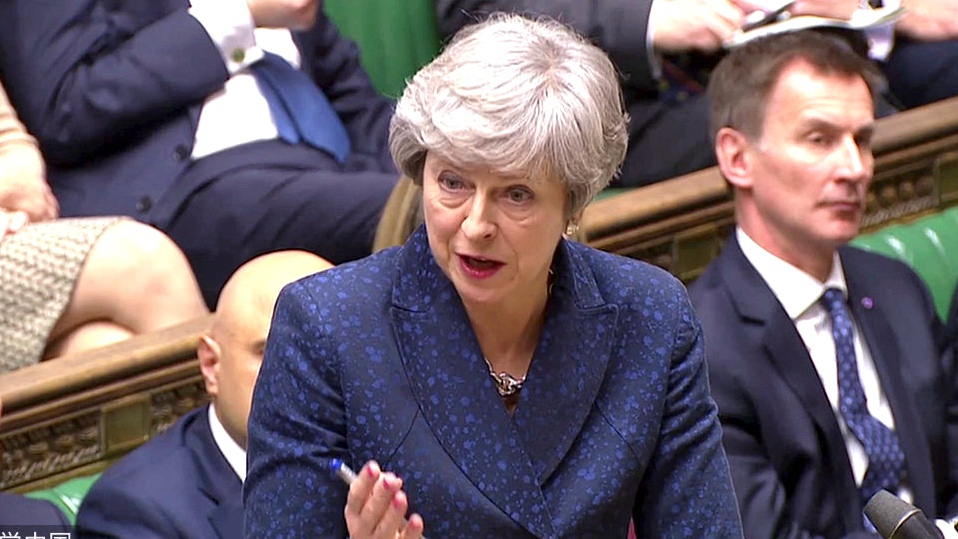
Europe
22:02, 23-Jan-2019
May: Attempts to delay Brexit do not solve the issue
Updated
09:13, 24-Jan-2019
CGTN
00:40

UK Prime Minister Theresa May said on Wednesday that attempts by some lawmakers to use parliamentary procedure to delay Brexit did not address the underlying decision about how Britain should leave the European Union (EU).
"What we have seen is amendments seeking to engineer a situation where Article 50 is extended -- that does not solve the issue, there will always be a point of decision. The decision remains the same: no deal, a deal or no Brexit," May told the parliament.
The UK would not be able to have an independent trade policy if it remained in a customs union with the EU after it leaves the bloc, May's political spokesman said on Wednesday.
May's deal with Brussels was roundly rejected by parliament last week and opposition Labour leader Jeremy Corbyn has called for her to seek an agreement which keeps the UK in a permanent customs union with the EU.
May needs to change her red lines in Brexit negotiations to get a deal that lawmakers will approve, a spokesman for the opposition Labour Party said on Wednesday, adding that she was running down the clock on talks.
"Nothing like her deal that was rejected in the House of Commons is going to pass in parliament. There is no amount o tweaking to it or modest changes that are going to change that reality. It is only if the red lines change," the spokesman told reporters.
On Monday, May proposed tweaking her deal, a bid to win over rebel Conservative lawmakers and the Northern Irish party which props up her government, but Labor said May was in denial about the crushing defeat of her plans.
Lawmakers will debate and vote on the next steps on January 29.
Read more:
Barnier: Britain must pay EU bill even in 'no deal'
The UK government would face a multi-billion-euro divorce settlement with the EU even if it leaves the bloc without a deal, Brussels negotiator Michel Barnier warned on Wednesday.
Some anti-Europeans, opposed to a negotiated settlement with Brussels, balk at the idea of settling a bill that their own government estimates at 39 billion pounds (44 billion euros) to cover outstanding obligations.
But Barnier, in interviews with several European newspapers, said the bill would still be settled at some point, even if London rejects the withdrawal agreement Britain signed in November and crashes out on March 29.
(Cover: A video grab from footage broadcast by the UK Parliament's Parliamentary Recording Unit (PRU) shows UK Prime Minister Theresa May as she speaks during the weekly Prime Minister's Questions (PMQs) in the House of Commons in London on January 23, 2019. /VCG Photo )
Source(s): AFP
,Reuters

SITEMAP
Copyright © 2018 CGTN. Beijing ICP prepared NO.16065310-3
Copyright © 2018 CGTN. Beijing ICP prepared NO.16065310-3